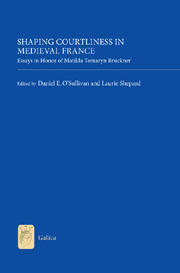Book contents
- Frontmatter
- Contents
- List of Illustrations
- Acknowledgements
- Introduction
- Matilda Tomaryn Bruckner: A Bibliography
- Part I Shaping Real and Fictive Courts
- Part II Shaping Courtly Narrative
- Part III Shaping Women's Voices in Medieval France
- Lombarda's Mirrors: Reflections on PC 288,1 as a Response 165 to PC 54,1
- Na Maria: Courtliness and Marian Devotion in Old Occitan Lyric
- From Convent to Court: Ermengarde d'Anjou's Decision to Reenter the World
- From Chrétien to Christine: Translating Twelfth-Century Literature to Reform the French Court during the Hundred Years War
- Part IV Shaping the Courtly Other
- Envoi
- List of Contributors
- Index
- Tabula Gratulatoria
- Already Published
Lombarda's Mirrors: Reflections on PC 288,1 as a Response 165 to PC 54,1
from Part III - Shaping Women's Voices in Medieval France
Published online by Cambridge University Press: 05 May 2013
- Frontmatter
- Contents
- List of Illustrations
- Acknowledgements
- Introduction
- Matilda Tomaryn Bruckner: A Bibliography
- Part I Shaping Real and Fictive Courts
- Part II Shaping Courtly Narrative
- Part III Shaping Women's Voices in Medieval France
- Lombarda's Mirrors: Reflections on PC 288,1 as a Response 165 to PC 54,1
- Na Maria: Courtliness and Marian Devotion in Old Occitan Lyric
- From Convent to Court: Ermengarde d'Anjou's Decision to Reenter the World
- From Chrétien to Christine: Translating Twelfth-Century Literature to Reform the French Court during the Hundred Years War
- Part IV Shaping the Courtly Other
- Envoi
- List of Contributors
- Index
- Tabula Gratulatoria
- Already Published
Summary
Inasmuch as the trobairitz personae are reflected through the mirrors of a whole set of different images for the woman, the domna, and the troubadour poet, we will truly hear their voices only when we enter into that hall of mirrors and follow the intricacies and echoes of its play.
I have chosen in this essay to accept Matilda Bruckner's open invitation to enter the “hall of mirrors” that reflect the various images of the trobairitz and to “follow the intricacies and echoes of its play.” Specifically, I shall look at the “precious” (in the best sense of that term) verses left to us by Na Lombarda, which, with their thematization of the mirror, lend themselves even better than the works of other trobairitz to scrutiny and ultimately to speculation.
I am of course not the first to examine the two coblas that constitute the small but rich poetic legacy of Na Lombarda. Indeed, during the brief span from 1989 to 1991, four important studies appeared, all written by women, each of whom views the verses of this trobairitz through a slightly different lens.
Sarah Kay focuses on how Lombarda uses derived rhyme to underscore, at a linguistic level, the reversal of gender roles that is at issue in this lively poetic debate.
- Type
- Chapter
- Information
- Shaping Courtliness in Medieval FranceEssays in Honor of Matilda Tomaryn Bruckner, pp. 165 - 182Publisher: Boydell & BrewerPrint publication year: 2013



